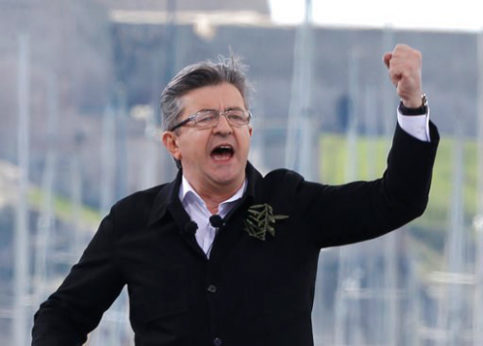
A political earthquake jolted France on Sunday when neither of the two mainstream parties that have dominated politics for the last forty years survived the first round of the country’s presidential election. The candidates of both the center-left Socialists and the center-right conservatives (currently known as The Republicans) failed to secure a spot in the May 7 run-off.
Instead, centrist Emmanuel Macron and neo-fascist Marine Le Pen advanced to the second round, while left-wing candidate Jean-Luc Mélenchon soared to a near-tie for third place in a late campaign surge. It was the best showing for a left candidacy since 1981 and is already raising hopes for a breakthrough in legislative elections scheduled for the summer.
The Republicans’ François Fillon bested Mélenchon by only a fraction of a point, but the biggest loser on Sunday night was Benoît Hamon, candidate of the Socialist Party. Dragged down by the unpopularity of outgoing President François Hollande, he barely topped six percent.
Attention is now turning to the Macron-Le Pen matchup that will take place in two weeks. It will be a battle between different visions for France’s role in Europe, its economic future, and its openness to immigrants and refugees.
Macron: Markets buoyed by banker’s victory

Investors and currency traders breathed a sigh of relief after Macron’s first-place finish with 23.9 percent of the vote. The euro was up against the U.S. dollar, French stocks and bonds were in demand, and Dow Jones futures soared 200 percent.
They had been fearing a Mélenchon-Le Pen contest – a left vs. right confrontation that would have left no acknowledged pro-business candidate in the race. The 39-year-old Macron, however, is a former investment banker who served a four-year stint at Rothschild & Cie Banque before being plucked by Hollande to serve in his government in 2012. By 2014, he was France’s finance minister – a position he held for two years.
Macron was the force behind the so-called “Macron Law” of 2015. The controversial measure, which was brought in by a Hollande decree without the approval of parliament, was aimed at liberalizing sections of the French economy. It made lay-offs of workers easier and expanded the hours during which businesses could operate. The law was also intended to reassure EU officials that the Hollande government was observing fiscal discipline.
With unemployment already high and job creation stagnant, the Macron Law – along with another bill known as the El Khomri Work Law that strengthened the hand of employers in collective bargaining negotiations – was met with strong opposition from France’s labor unions.
With the Socialist Party in near collapse due to infighting over economic mismanagement and a number of other issues, Macron bolted in 2016 to form his own independent party, “En Marche,” as a vehicle for a presidential run. Taking with him the support of much of the Socialists’ right wing, Macron presented himself in the election as a “third way”-type candidate with politics beyond the traditional left/right divide.
Billed as the most pro-Europe candidate, Macron has said he intends to “restore the credibility of France in the eyes of Germany, to convince Berlin in the next six months to adopt an active investment policy and move towards greater solidarity in Europe.”
His austerity-lite platform includes a merger of public and private pension systems; strict public spending control measures which would trim €60 billion annually; slashing the corporate tax rate from 33 to 25 percent; 120,000 job cuts in the public sector; and leaving application of France’s 35-hour workweek up to negotiations between workers and employers.
In an attempt to hold onto center-left voters, however, Macron also promises housing tax exemptions; full health coverage for glasses, dentures, and hearing needs; changes to social welfare benefits amounting to approximately an extra month’s wage for low income earners; and €15 billion for job training programs.
Le Pen: Capitalizing on xenophobia
While Macron fretted over reassuring Berlin, Marine Le Pen stoked nationalist sentiments and anti-foreigner feelings to propel her far-right Front National party to a close second-place finish, garnering 21.4 percent. She campaigned on pledges to close France’s borders, dump the euro currency in favor of the franc, and stage a referendum on EU membership.
Marine Le Pen is the second in her family to head the Front National (FN). Her father, Jean-Marie Le Pen, also led the FN to a historic second place finish in the 2002 presidential election. Criminally charged for inciting racial hatred and Holocaust denial several times, the senior Le Pen’s anti-Semitism and open racism became major liabilities for the FN over the years.
Elected to succeed her father in 2011, Marine Le Pen has worked to put a more civilized face on the party. Despite her makeover, it still has an anti-immigrant, French supremacist vision at its core. Able to take advantage of the discontent sparked by a sustained period of economic malaise, though, she has enjoyed some success in rehabilitating the FN. In 2014, she led the party to victory in elections to the European Parliament, winning nearly 25 percent of votes nationwide.
Throughout the presidential campaign, Le Pen attempted to present her candidacy as a movement for national renaissance. And moving somewhat parallel to Macron, she declared hers was a post-partisan party.
“The French have been dispossessed of their patriotism,” she said in a speech a few weeks before the vote. “They are suffering in silence from not being allowed to love their country…The divide is no longer between the left and the right, but between the patriots and the globalists.”
In addition to withdrawing from the EU, Le Pen promised that as president she would institute a tax on imports and on companies that hire non-citizens, sharply cut the number of migrants allowed to enter the country, expel undocumented immigrants, and hire 15,000 new police officers. Social benefits such as free education, public housing, and job support would be reserved for citizens only through a “French first” policy.
Populist pledges, such as an increase of welfare benefits, cuts to income taxes, and a lowering of the retirement age were used to target working class voters, especially in post-industrial constituencies which traditionally vote for the Socialists or the Communists.
Utilizing a local version of a mantra that has been employed by right-wing nationalists around the world recently, Le Pen focused her fire on Islam and the elites behind economic globalization. She characterized Islamic fundamentalism as a “yoke” on France, with veils and mosques representing threats to national culture.
“Financial globalization and Islamist globalization are helping each other out,” she told supporters. “Those two ideologies aim to bring France to its knees.”
She received tacit endorsements from U.S. President Donald Trump and Russian President Vladimir Putin. Trump called her “the strongest” candidate in the race, while Putin met with her in the Kremlin last month, and a Russian bank linked to the president has provided loans to finance the FN’s campaign.
A silver lining for the left?

In a statement released immediately following the announcement of election results, the French Communist Party (PCF), which backed Mélenchon, declared that the country had entered an “extremely grave” time, given the advance of Le Pen and the FN.
The PCF characterized Le Pen as a threat to democracy that must be defeated in the second round on May 7. It urged a reluctant vote for Macron, saying, however, that the party’s endorsement “is obviously in no case a show of support” for his “neoliberal, anti-social program.” The PCF said that it opposed Macron’s plans when he was finance minister and that it “will continue to fight without concession whenever workers and their rights and public services are under attack.”
Michel Muller, a member of the PCF’s international relations commission, told People’s World that Macron was able to portray himself as a “newcomer looking morally clean in comparison” with Fillon, the traditional rightist candidate.
The Republicans, what remains of the Socialists, and others will rally to Macron, Muller predicted, “pretending that their only game is stop Le Pen,” even though “their biggest fear is destruction of their system.”
But although the second round has now come down to a choice between Macron’s neoliberal centrism and the neo-fascist nationalism of Le Pen, the PCF and left-wing forces still find something positive in the outcome.
With Mélenchon securing 20 percent as the candidate of a broad alliance of left-wing parties and groups, the PCF said the campaign represents “a new era” for the French left.
Maurice Ulrich, writing in the newspaper L’Humanite, said that French politics is now characterized by four distinct groupings: Le Pen’s far-right nationalists, a weakened conservative center-right, the social liberals grouped around Macron, and a solid left that came together around Mélenchon. Even though the Socialist Party is in complete disarray, Ulrich said that the anti-austerity messaging which defined the Mélenchon campaign and won the support of a fifth of the electorate provides the left with a “base to rebuild.”
The PCF urged its members and supporters to vote for Macron in the run-off, but then to quickly pivot toward building for the legislative elections due in June.
Saving democracy
Most polls and commentators predict Macron will easily sail to victory over Le Pen in the second round; some foresee him scoring as much as 65 percent. He will be hoping to count on the votes of people from a range of social classes and adherents of a variety of political ideologies simply by being the only non-Le Pen option left standing. He has now become the de-facto anti-fascist candidate.
Muller of the PCF said that, barring a “tremendous accident,” Macron will be elected president, calling the second round “a formality.” He said that Macron will be victorious on a “miscellaneous majority,” as he has “no politically organized electoral base.”
The Front National, meanwhile, clings to the hope that anti-austerity voters fed up with a stalled economy and the EU’s prescriptions of greater fiscal austerity will give Le Pen another look. With Macron being the very personification of the current socioeconomic order, the far-right can now position itself as the last remaining anti-establishment alternative.
Le Pen is looking to repeat in France the same kind of poll-defying result which saw Donald Trump elected U.S. president and Britain opt to leave Europe last year. While it looks unlikely, should it happen, a Le Pen presidency could mean the end of not only the European Union, but of French democracy itself.











